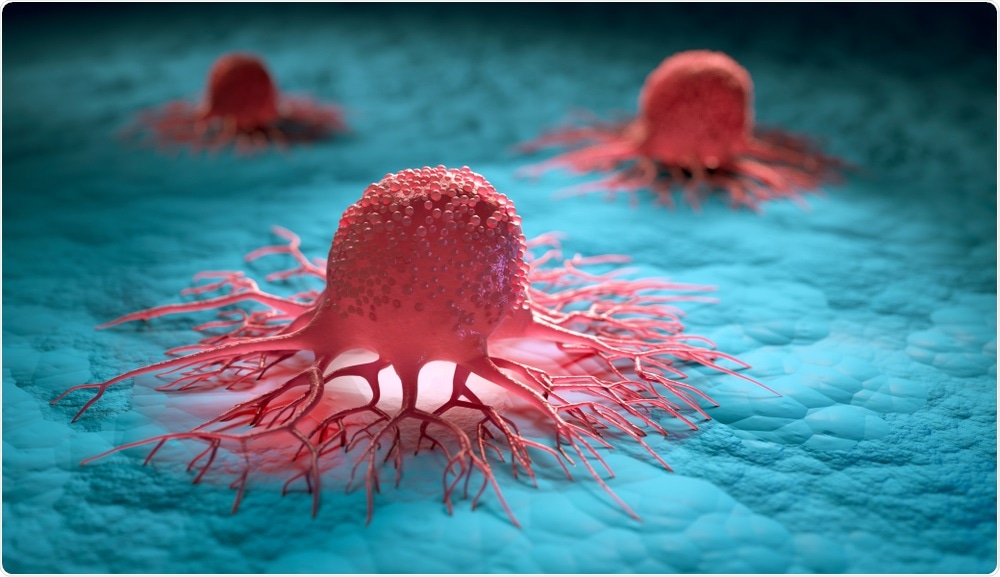Scientists are increasingly trying to use the body's own immune system to fight cancer. A new study by the University of Bonn and research institutions in Australia and Switzerland now shows the strategies tumor cells use to evade this attack.

Image Credit: peterschreiber.media/Shutterstock.com
The method developed for this work contributes to a better understanding of the "arms race" between immune defense and disease. The results could help to improve modern therapeutic approaches. They have been published in the journal Immunity.
Cancer cells differ from healthy body cells - in their appearance, their behavior and the genes that are active in them. Often this does not go unnoticed: The immune system registers that something is wrong and dispatches its troops to fight the tumor. However, this response is often too weak to keep the cancer in check in the long term or even destroy it.
Researchers have therefore been trying for many years to strengthen the immune system's defensive reaction. They do this in a similar way to a policeman who puts his dog on the trail of an escaped criminal. In this case, the role of the sniffer dog is taken over by the cytotoxic T cells: They can detect and kill sick or defective cells.
Each T cell is directed against a specific characteristic, also called antigen. For cancer therapy, the researchers are therefore looking for T cells in patients that detect tumor antigens. They can then for instance multiply these and inject them back into the patient. In this way they strengthen the patient's immune response against the cancer.
However, many tumors have unfortunately developed strategies that enable them to evade the immune system. "In our study, we investigated what these strategies look like and what this depends on," explains Dr. Maike Effern from the Institute of Experimental Oncology at the University Hospital Bonn. "We focused on skin cancer, namely melanoma cells."
Melanomas differ from healthy cells in several ways. For example, a whole range of different genes are active in them. Each of these is a potential antigen for T cells. But which is particularly suitable for triggering a strong and lasting immune response?
To answer this question, the researchers invented a clever method in their experimental model: They attached a kind of label to various genes that are active in the development of melanoma cells and used them to produce antigens. They then released a group of T cells against the tumor cells, which recognized exactly this molecular label as a disease marker.
The researchers then used this strategy to investigate how the cancer cells react to being pursued by the immune system. Depending on the gene tagged with such a label, they found significant differences.
Cancer cells hide from the immune system
"When the T cells were directed against genes responsible for melanoma-typical characteristics, we observed that the cancer cells changed their appearance and suppressed these genes over time," explains Effern's colleague Dr. Nicole Glodde. "So this is how they hide from the immune system."
In contrast, another gene investigated in the study is essential for the tumor's survival. This makes it not so easy to downregulate and thus hide. "In our view, this gene therefore has the potential to induce a very effective T cell response," Effern emphasizes.
"Our work potentially clears the way to more effective immune therapies," hopes Prof. Dr. Michael Hölzel, head of the Institute of Experimental Oncology at the University Hospital Bonn and member of the Cluster of Excellence ImmunoSensation at the University of Bonn. "The method we have developed also makes it possible to better understand the processes by which cancer cells slip under the radar of the immune system."
The study was partly funded by the German Research Foundation (DFG) within the framework of an international graduate school. This is why Dr. Maike Effern spent a year working on this project at the Peter Doherty Institute in Melbourne (Australia) under Prof. Thomas Gebhardt, an internationally renowned expert in the field of immune recognition.
The graduate school between the Universities of Bonn and Melbourne is an outstanding example of international cooperation in research and for me personally an experience that will have a lasting impact on my future career,"
Effern
Journal reference:
- Maike Effern, Nicole Glodde, Matthias Braun, Jana Liebing, Helena N. Boll, Michelle Yong, Emma Bawden, Daniel Hinze, Debby van den Boorn-Konijnenberg, Mila Daoud, Pia Aymans, Jennifer Landsberg, Mark J. Smyth, Lukas Flatz, Thomas Tüting, Tobias Bald, Thomas Gebhardt, Michael Hölzel: Adoptive T cell therapy targeting different gene products reveals diverse and context-dependent immune evasion in melanoma. Immunity, DOI: https://doi.org/10.1016/j.immuni.2020.07.007